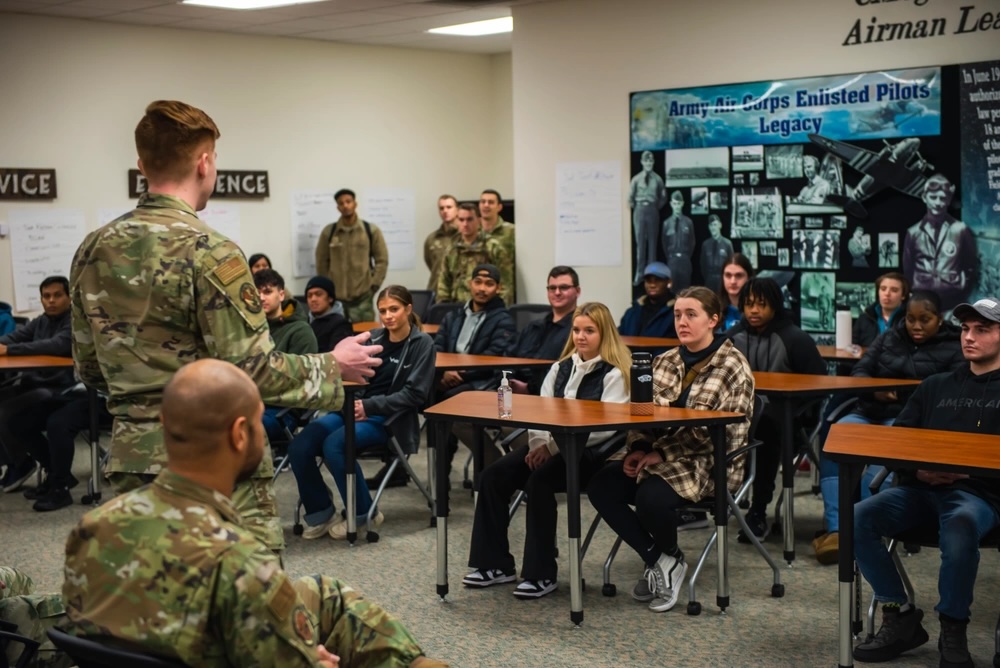AURORA, Colo.—The head of the Air Force Recruiting Service remains “cautiously optimistic” about hitting his recruiting goals for fiscal 2024 year, armed with positive data from the first five months.
AFRS is at just over 100 percent of its requirement at this point for the Active-Duty force, close to it for the reserves, and at goal for the Space Force, with a sizable number of recruits in the delayed entry pool (DEP) who will enter service over the coming months.
“We are currently almost completed with bookings in February and March and we’re booking well into April,” Brig. Gen. Christopher Amrhein told reporters Feb. 13 at the AFA Warfare Symposium. “So right now, we’re not seeing the edge of the cliff.”
However, trouble could be on the horizon if Congress relies on continuing resolutions (CR) instead of passing a larger spending bill. Recruiting ads and outreach efforts cost money, Amrhein explained, and meeting requirements will be much more difficult if AFRS cannot sustain its presence on social media and television and in classrooms and community spaces.
“Bottom line, when a CR is in effect, our recruiting, outreach, and advertising mission suffers,” he said. “Additionally, a CR or, even worse, sequestration efforts would directly limit our ability to execute our recruiting operations.”
Under the Fiscal Responsibility Act passed in June 2023, if a CR is still in effect on April 30, the entire federal government will see funding slashed across the board to the tune of billions of dollars, according to the Congressional Research Service. The latest CR expires in early March, and Congress has been slow to agree on a larger budget.
If funding can be sustained, though, the future appears to be looking up for AFRS, which in fiscal 2023 missed its goal of 26,877 Air Force recruits by about 10 percent, the first time it missed its goal in 24 years. A heroic effort by recruiters in the summer of 2023 built up a strong delayed entry pool that AFRS continued to build on in the months since.
Efforts to widen the pool of eligible recruits—such as allowing small neck and hand tattoos; aligning body fat composition rules with Defense Department Standards; and giving qualified applicants a chance to retest if they test positive for marijuana use—have also helped. New incentives such as reinstating the enlisted college loan repayment program, streamlining the naturalization process for trainees to become citizens at the end of Basic Military Training, and increasing enlistment bonuses played a significant role too.
Just as important, Amrhein noted that recruiters are finally rebuilding the relationships with schools and communities, relationships which degraded during the years of isolation caused by the COVID-19 pandemic.

But there is still one major impediment that could be turning away thousands of qualified recruits: the medical assessment process, where recruits often have to wait months to find out if they meet the military’s health requirements for accession.
“One otherwise healthy applicant had to wait an extra two months to enlist while she proved that a childhood wrist sprain was not a disqualifying medical condition,” Sen. Elizabeth Warren (D-Mass.), chair of the Senate Armed Services Committee’s subcommittee on personnel, said at a Dec. 6 hearing where the heads of each military branch’s recruiting service testified.
“Now obviously we want a screening process that catches disqualifying medical conditions, but … [is it] creating unnecessary barriers to enrollment?” she asked.
Warren called on each service to track why applicants leave the accessions process before signing the dotted line, and AFRS appears to have initial data. At the AFA Warfare Symposium, Amrhein shared that 8,800 Air Force applicants walked away due to the long medical review process in fiscal 2023.
AFRS typically approves nearly 70 percent of overall requests for medical waivers, the general said, so that means it lost about 5,600 applicants who likely could have passed if the medical process were faster.
Last year, AFRS hired about 60 contractors to help with the medical paperwork, which should accelerate the process. But part of the problem is MHS Genesis, the medical records program which connects to most civilian health information exchange networks, giving the services a closer look at an applicant’s medical history.
The issue is that the history “is often incomplete or contains insufficient information to make a waiver determination,” the Department of Defense Inspector General found in May, which slows down the process as the services request extra documentation.
“We have to condense [the timeline] to get it back to where it used to be,” Amrhein said. “Prior to MHS Genesis onboarding, it was at least half, if not a third of the time to medically assess someone. If we can continue to work that piece, I think we can garner a great number of folks to join our Air and Space Forces.”

